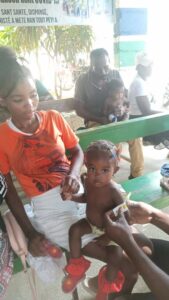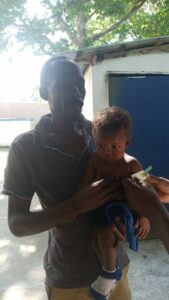Thomassique, a small town situated on the central plain of Haiti, is home to St. Joseph Clinic. Constructed by Medical Missionaries, this clinic aims to serve the people of Thomassique and surrounding villages by offering crucial healthcare services. These services encompass general consultations, prenatal and postnatal care, sonography, laboratory assistance, and hypertension management programs, among others. A key component of their efforts is the Mother and Infant Care (MIC) program, which guarantees that every child born at the clinic undergoes six consultations and is enrolled in both vaccination and nutrition initiatives.
What does the Mother and Infant Care (MIC) program provide for families?
 Alfred was born in March 2022 and was admitted to the MIC program the following month. His mother received both prenatal and postnatal consultations at St. Joseph Clinic. Throughout her pregnancy, she experienced anemia, and ultimately gave birth to Alfred at the clinic. During one of their consultations, it was discovered that Alfred had high blood pressure as a result of malnutrition. The doctors promptly enrolled him in the MIC program, and since then, Alfred has flourished.
Alfred was born in March 2022 and was admitted to the MIC program the following month. His mother received both prenatal and postnatal consultations at St. Joseph Clinic. Throughout her pregnancy, she experienced anemia, and ultimately gave birth to Alfred at the clinic. During one of their consultations, it was discovered that Alfred had high blood pressure as a result of malnutrition. The doctors promptly enrolled him in the MIC program, and since then, Alfred has flourished.
The Mother and Infant Care (MIC) program at St. Joseph Clinic starts supporting mothers during pregnancy. Expectant mothers can access prenatal care at the clinic, where they are also given guidance on self-care and preparing for their baby’s arrival.
 Other examples are similar. For example Dieuvelone was born in October of 2021. She entered into the program in April of 2022 and has done well since. Her family works the land but lives in poverty. As it is, she is 18 months old and weighs less than 15 lbs. In this picture she came to the clinic to receive vaccines.
Other examples are similar. For example Dieuvelone was born in October of 2021. She entered into the program in April of 2022 and has done well since. Her family works the land but lives in poverty. As it is, she is 18 months old and weighs less than 15 lbs. In this picture she came to the clinic to receive vaccines.
Following the birth, the family is provided with a kit containing baby clothes, and a home visit is conducted within a few days. Both the mother and child are then eligible for six free consultations throughout the next year. During these appointments, the child receives vaccinations and is assessed for malnutrition. If there is a risk of malnutrition, the program takes immediate action by enrolling the child in a specialized malnutrition initiative. Families in this program receive monthly supplies of Medika Mamba, flour, milk and seeds to cultivate small gardens.
 Jean is 6 months old and is doing great due to the MIC program. His parents are subsistence farmers and without the support from MIC Jean would be suffering from malnutrition.
Jean is 6 months old and is doing great due to the MIC program. His parents are subsistence farmers and without the support from MIC Jean would be suffering from malnutrition.
To ensure accessibility, the MIC program covers transportation costs for high-risk children attending prenatal consultations. In cases of childbirth complications, the program also pays for referral fees for the family to travel to Hinche. Hinche is home to a larger hospital but is more than an hour away by vehicle—a mode of transportation that few patients possess.


